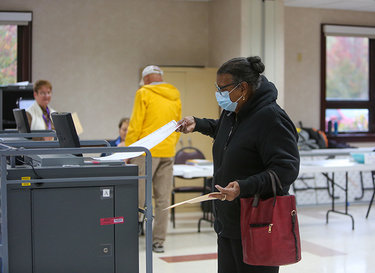Rensselaerville puts off polling-place reduction
Enterprise file photo — Michael Koff
An early voter casts her ballot on Monday at the Guilderland EMS station. Guilderland pays the county’s board of elections over $70,000 annually for polling. The town of Rensselaerville currently has polling places at each of its three firehouses, and has tabled an idea to hold all voting at the town hall instead.
RENSSELAERVILLE — Rensselaerville will not be consolidating its polling stations this year, owing to concerns about voter accessibility and the fact that the deadline to request the change for this year’s election has already passed.
Although the Rensselaerville Town Board, at its Feb. 22 meeting, acknowledged that the proposal wouldn’t be workable this year, Supervisor John Dolce, who had brought the idea up in the first place, expressed a desire to revisit the issue later.
Deputy Supervisor Brian Wood told the board that his perception was that people who are against the consolidation aren’t firmly against it, but prefer to vote at one of the three fire district houses as they have been, instead of only at the town hall.
“I do agree that there is a possibility that having [voting take place] here might prohibit people from voting if they were comfortable voting in other places,” Wood said before going on to advise Dolce to lobby for the change over the next year.
Dolce said the impetus for the suggestion was cost-savings, since the expense associated with polling places is going up, and goes up unpredictably each year, making it hard to budget for.
He had disagreed with some of the accessibility concerns with voting at the town hall.
“Someone said the elderly can’t drive,” Dolce said. “Nobody’s walking to the firehouse, so, to me, that’s a non-issue. Everybody’s driving.”
Of concerns about the ability of the town hall to accommodate a larger number of voters than any of the firehouses do, Wood said that, while the number of machines would be lower, the more salient factor is the number of booths where people fill out their ballots, on which there would be no real limit.
The board also discussed the prevalence of early and absentee voting, which would make accessibility less of a concern as well.
Wood said he thinks there are “ways to make it successful,” like offering rides to those who need one, but wondered also about how to make the current setup more amenable to the town.
For instance, he said, the town should be able to request cost estimates from the Albany County Board of Elections in October, since most factors involved in election costs should be fairly predictable.
“Why can’t we ask them to do the same thing we do with the EMS agency and everything else?” Wood asked. “We expect the sheriff to present the budget in October of what the … costs are going to be.”
The county’s board of elections did not respond to Enterprise inquiry about its ability to work with towns to better predict costs in advance, among other things.



